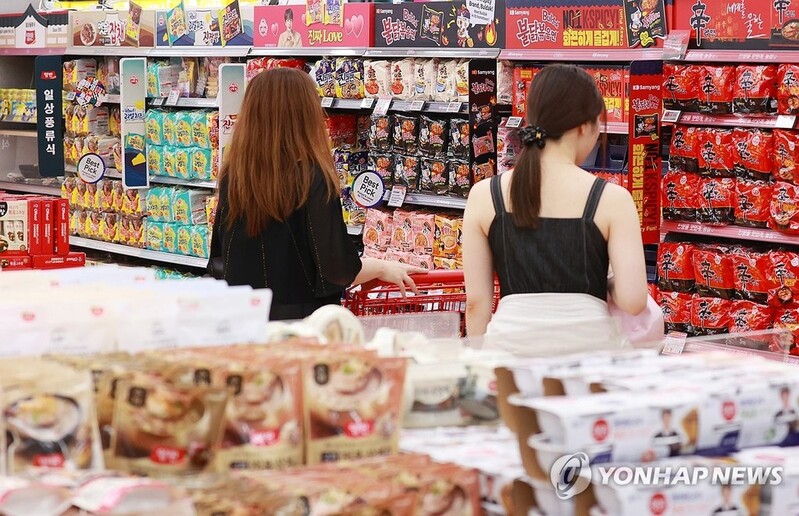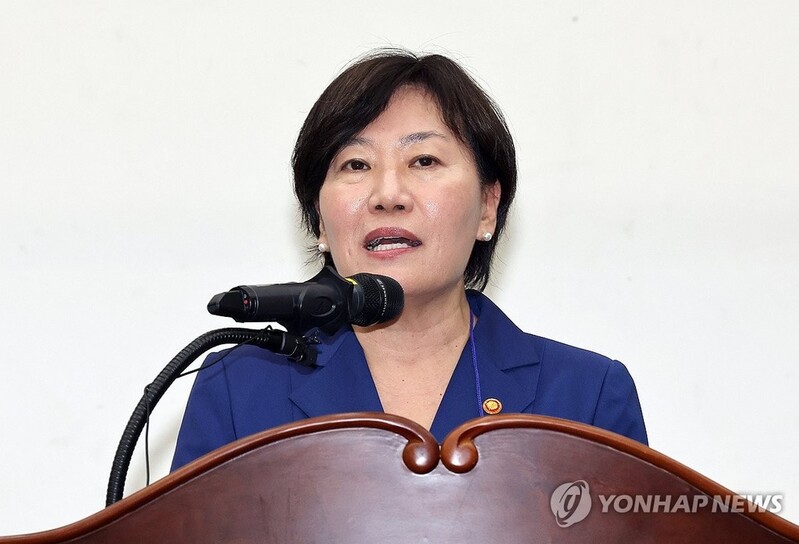 |
| ▲ Customers shop for groceries at a discount store in Seoul in this Aug. 11, 2025, file photo. (Yonhap) |
 |
| ▲ Agriculture Minister Song Mi-ryung speaks at a launching ceremony of a consultative body for agricultural policy held in the central city of Sejong on Aug. 20, 2025. (Yonhap) |
(LEAD) food exports-US tariffs
(LEAD) Food exports to U.S. drop in July due to reciprocal tariffs: data
(ATTN: ADDS gov't response in last 4 paras, photo)
SEOUL, Aug. 20 (Yonhap) -- South Korea's food exports to the United States posted the first on-year decline in around two years in July, due to Washington's sweeping tariff scheme, data showed Wednesday.
The country exported US$139 million worth of agricultural goods and food products to the U.S. last month, down 6.7 percent from the same month last year, according to the data from the Korea Trade Statistics Promotion Institute.
It marks the first time since May 2023 that the country's food exports to the U.S. dropped from a year earlier.
By item, shipments of instant noodles, or "ramyeon" in Korean, one of the key export items, retreated 17.8 percent on-year to $14 million.
Exports of snacks fell by an even greater margin of 25.9 percent to $20 million, while those of sauces and ginseng dipped 7.2 percent and 13.4 percent on-year, respectively.
Cumulative exports to the U.S. in the January-July period grew 21.3 percent from the same period last year. The growth rate, however, slowed sharply from a 27 percent on-year growth for the January-June period.
Industry officials partly attributed the slowdown to companies securing stocks ahead of Washington's tariff deadline. The Donald Trump administration had announced plans to levy 15 percent tariffs on all South Korean goods starting Aug. 7.
Such panic buying was particularly noticeable in instant ramyeon, whose shipments to the U.S. had spiked 58.7 percent on-year in June.
Food exports could fall even further, as U.S. consumers reduce spending amid a grim outlook for the country's economy, market watchers said.
"Local companies operating in the U.S. were unable to avoid the effects from a slowdown in consumer spending," said analyst Kang Eun-ji from Korea Investment & Securities Co., noting U.S. sales of major food companies, such as CJ CheilJedang Corp., declined in the second quarter.
To address the situation, Agriculture Minister Song Mi-ryung held a meeting with major food companies here, including Samyang Foods Inc., CJ Cheiljedang Corp. and Nongshim Co., later Wednesday and discussed measures to boost food exports.
At the meeting, which marked the third of its kind to be held, the minister said the government will expand export vouchers for food companies and extend the insurance program for currency exchange volatility, according to her office.
The ministry will also support the companies' efforts to diversify their export destinations to the Middle East and Latin America, while expanding their foothold in the American market.
"K-food exports are a key growth driver not only behind the national economy but also enhancing the national brand," Song said, adding that the government will work to foster exports of Korean food in connection with the rising popularity of Korean culture and arts.
(END)
(C) Yonhap News Agency. All Rights Reserved























